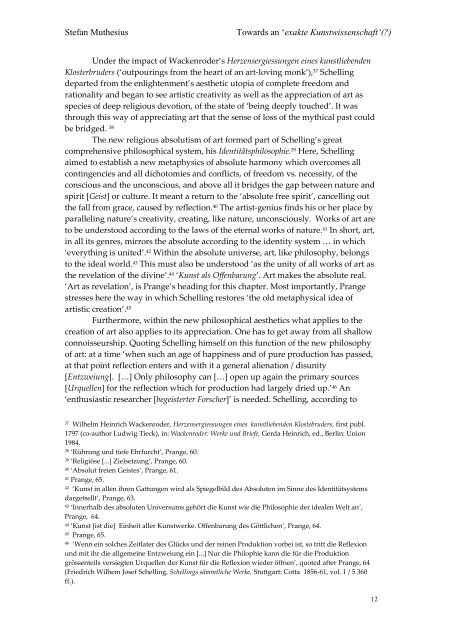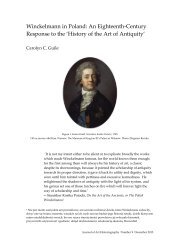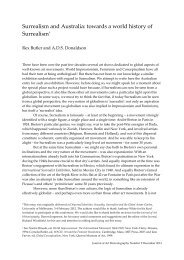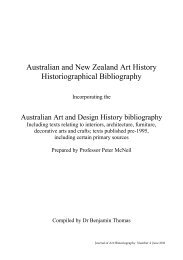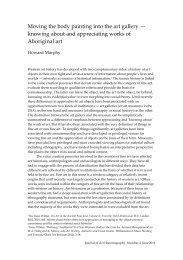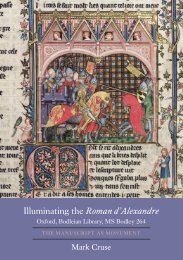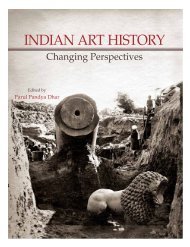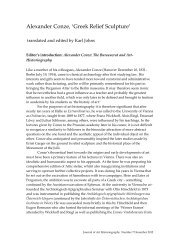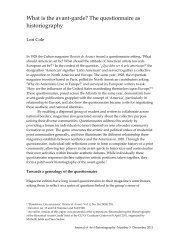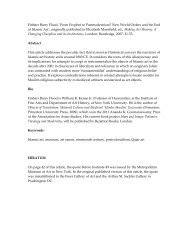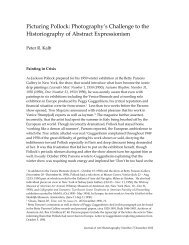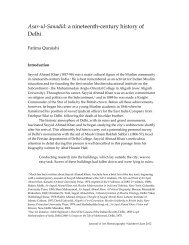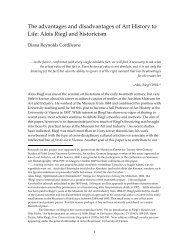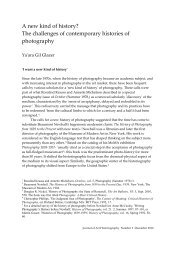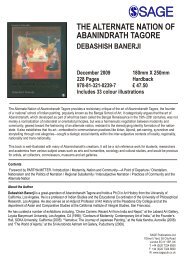9/SM1 - Journal of Art Historiography
9/SM1 - Journal of Art Historiography
9/SM1 - Journal of Art Historiography
You also want an ePaper? Increase the reach of your titles
YUMPU automatically turns print PDFs into web optimized ePapers that Google loves.
Stefan Muthesius<br />
Towards an ‘exakte Kunstwissenschaft‘(?)<br />
Under the impact <strong>of</strong> Wackenroder’s Herzensergiessungen eines kunstliebenden<br />
Klosterbruders (‘outpourings from the heart <strong>of</strong> an art-loving monk’), 37 Schelling<br />
departed from the enlightenment’s aesthetic utopia <strong>of</strong> complete freedom and<br />
rationality and began to see artistic creativity as well as the appreciation <strong>of</strong> art as<br />
species <strong>of</strong> deep religious devotion, <strong>of</strong> the state <strong>of</strong> ‘being deeply touched’. It was<br />
through this way <strong>of</strong> appreciating art that the sense <strong>of</strong> loss <strong>of</strong> the mythical past could<br />
be bridged. 38<br />
The new religious absolutism <strong>of</strong> art formed part <strong>of</strong> Schelling’s great<br />
comprehensive philosophical system, his Identitätsphilosophie. 39 Here, Schelling<br />
aimed to establish a new metaphysics <strong>of</strong> absolute harmony which overcomes all<br />
contingencies and all dichotomies and conflicts, <strong>of</strong> freedom vs. necessity, <strong>of</strong> the<br />
conscious and the unconscious, and above all it bridges the gap between nature and<br />
spirit [Geist] or culture. It meant a return to the ‘absolute free spirit’, cancelling out<br />
the fall from grace, caused by reflection. 40 The artist-genius finds his or her place by<br />
paralleling nature’s creativity, creating, like nature, unconsciously. Works <strong>of</strong> art are<br />
to be understood according to the laws <strong>of</strong> the eternal works <strong>of</strong> nature. 41 In short, art,<br />
in all its genres, mirrors the absolute according to the identity system … in which<br />
‘everything is united’. 42 Within the absolute universe, art, like philosophy, belongs<br />
to the ideal world. 43 This must also be understood ‘as the unity <strong>of</strong> all works <strong>of</strong> art as<br />
the revelation <strong>of</strong> the divine’. 44 ‘Kunst als Offenbarung’. <strong>Art</strong> makes the absolute real.<br />
‘<strong>Art</strong> as revelation’, is Prange’s heading for this chapter. Most importantly, Prange<br />
stresses here the way in which Schelling restores ‘the old metaphysical idea <strong>of</strong><br />
artistic creation’. 45<br />
Furthermore, within the new philosophical aesthetics what applies to the<br />
creation <strong>of</strong> art also applies to its appreciation. One has to get away from all shallow<br />
connoisseurship. Quoting Schelling himself on this function <strong>of</strong> the new philosophy<br />
<strong>of</strong> art: at a time ‘when such an age <strong>of</strong> happiness and <strong>of</strong> pure production has passed,<br />
at that point reflection enters and with it a general alienation / disunity<br />
[Entzweiung]. […] Only philosophy can […] open up again the primary sources<br />
[Urquellen] for the reflection which for production had largely dried up.’ 46 An<br />
‘enthusiastic researcher [begeisterter Forscher]’ is needed. Schelling, according to<br />
37<br />
Wilhelm Heinrich Wackenroder, Herzensergiessungen eines kunstliebenden Klostebruders, first publ.<br />
1797 (co-author Ludwig Tieck), in: Wackenroder: Werke und Briefe, Gerda Heinrich, ed., Berlin: Union<br />
1984.<br />
38<br />
‘Rührung und tiefe Ehrfurcht’, Prange, 60.<br />
39<br />
‘Religiöse [...] Zielsetzung’, Prange, 60.<br />
40<br />
‘Absolut freien Geistes’, Prange, 61.<br />
41<br />
Prange, 65.<br />
42<br />
‘Kunst in allen ihren Gattungen wird als Spiegelbild des Absoluten im Sinne des Identitätsystems<br />
dargetsellt’, Prange, 63.<br />
43<br />
‘Innerhalb des absoluten Universums gehört die Kunst wie die Philosophie der idealen Welt an’,<br />
Prange, 64.<br />
44<br />
‘Kunst [ist die] Einheit aller Kunstwerke. Offenbarung des Göttlichen’, Prange, 64.<br />
45<br />
Prange, 65.<br />
46<br />
‘Wenn ein solches Zeitlater des Glücks und der reinen Produktion vorbei ist, so tritt die Reflexion<br />
und mit ihr die allgemeine Entzweiung ein [...] Nur die Philophie kann die für die Produktion<br />
grössenteils versiegten Urquellen der Kunst für die Reflexion wieder öffnen’, quoted after Prange, 64<br />
(Friedrich Wilhem Josef Schelling, Schellings sämmtliche Werke, Stuttgart: Cotta 1856-61, vol. 1 / 5 360<br />
ff.).<br />
12


